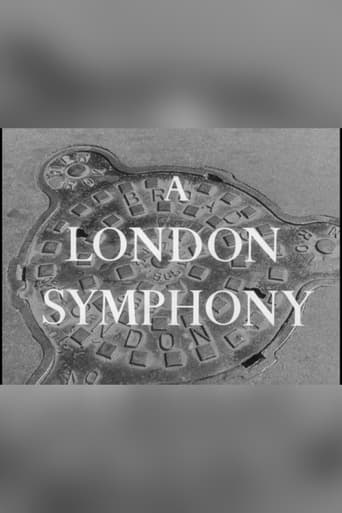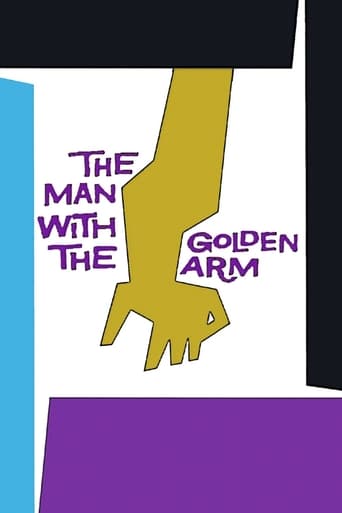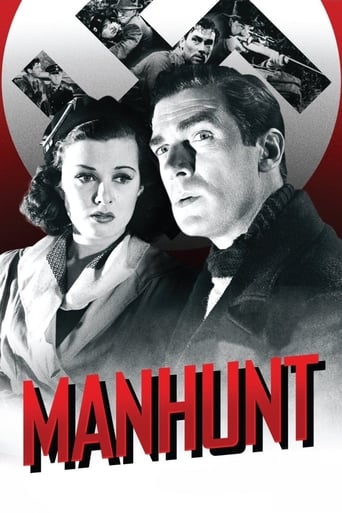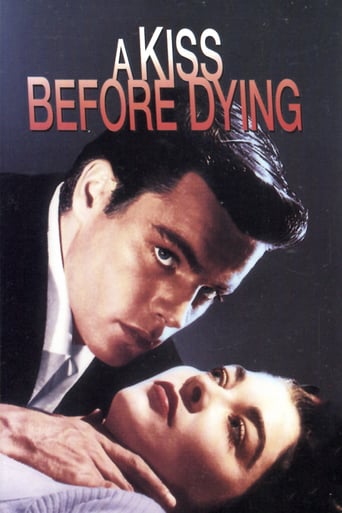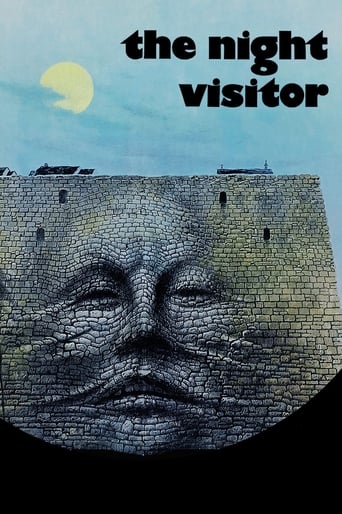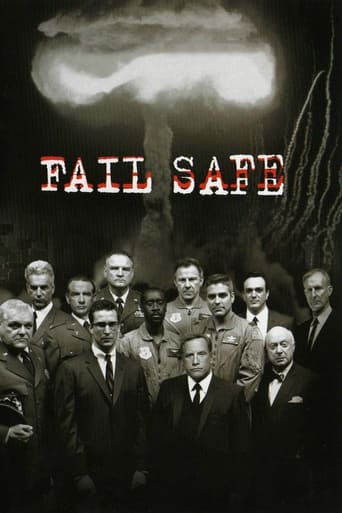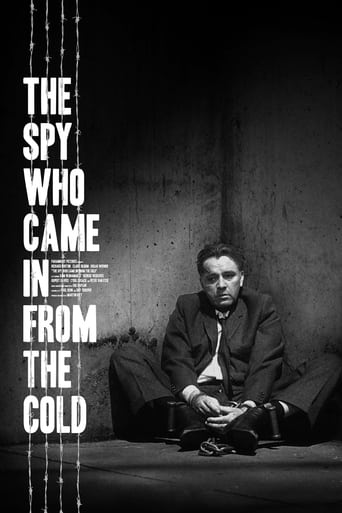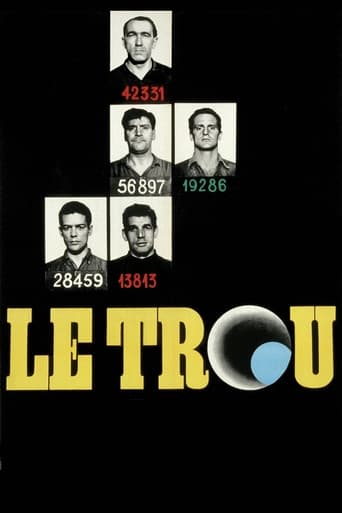


Le Trou
Four prison inmates have been hatching a plan to literally dig out of jail when another prisoner, Claude Gaspard, is moved into their cell. They take a risk and share their plan with the newcomer. Over the course of three days, the prisoners and friends break through the concrete floor using a bed post and begin to make their way through the sewer system -- yet their escape is anything but assured.
-
- Cast:
- Michel Constantin , Jean Keraudy , Philippe Leroy , Raymond Meunier , Marc Michel , Jean-Paul Coquelin , André Bervil


Similar titles

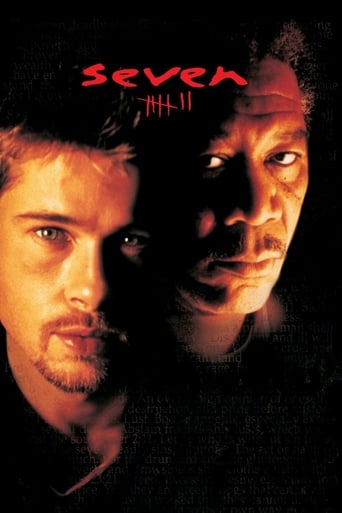
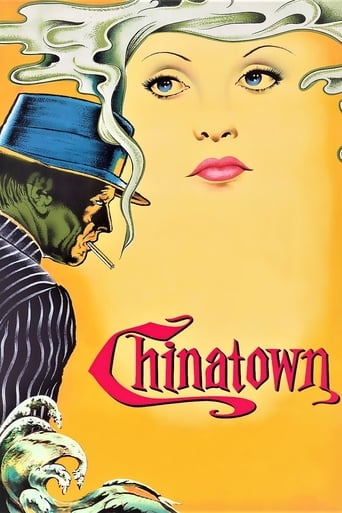
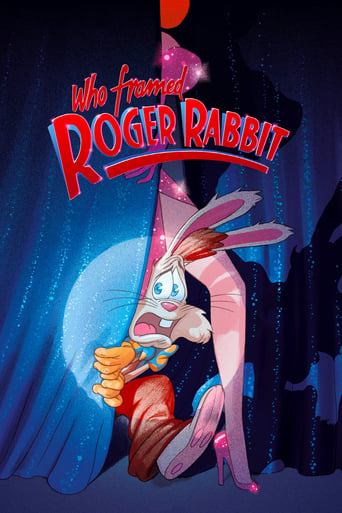
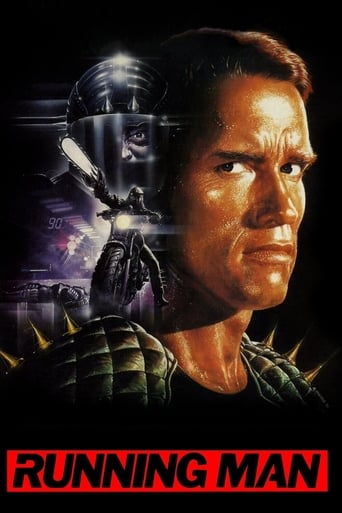
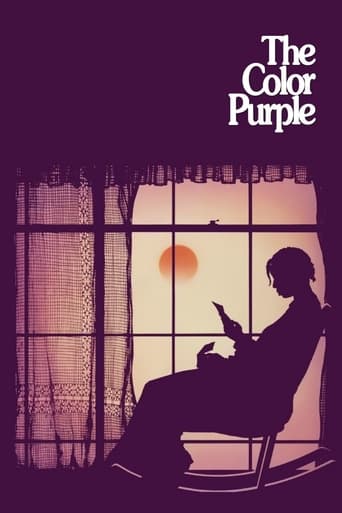
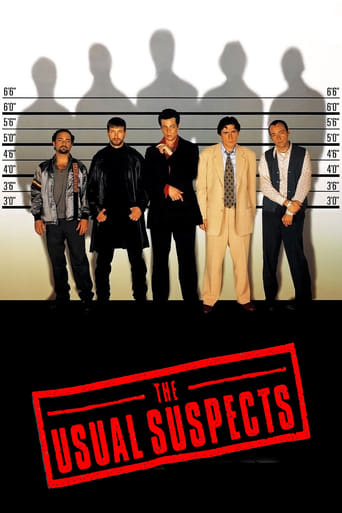
Reviews
Waste of time
Strong and Moving!
Excellent adaptation.
This movie tries so hard to be funny, yet it falls flat every time. Just another example of recycled ideas repackaged with women in an attempt to appeal to a certain audience.
I was not familiar with any of Becker's other films when I decided to check out Le Trou at Film Forum theatre the other day, and of course now will be seeking out his other films. I found Le Trou to be both super interesting and entertaining. Le Trou contains very few, if any of the traditional characters and storylines that seem to be requisite for modern day prison films (the corrupt guards who abuse their power and the inmates, the inmates who have an 'in' with someone in the prison system and get away with murder - literally and figuratively - the prisoner who everyone else picks on mercilessly, the 'king' inmate who everyone fears and really runs the place etc.) No , this is a very different prison film, very straightforward with no prison film cliches. Apparently most of the actors were non-professionals, but they were all great, believable, and likable. Also, there are many inmates to one room/cell, which creates a very strong bond amongst those sharing the cell and it's this grouping together that for me gave the film a kind of unique intimacy. Some reviewers complained about the loud banging as the prisoners tried to tunnel their way out, but I didn't even notice it, everything seemed natural and right to me. Le Tour is suspenseful and engaging throughout.
Le Trou (The Hole) is directed by Jacques Becker and adapted to screenplay by Becker, Jose Giovani and Jean Aurel from Giovani's own novel. It stars Michel Constantin, Jean Keraudy, Philippe Leroy, Raymond Meunier, Marc Michel and Jean-Paul Coquelin. Jacques Becker's last film before he would pass away shortly after the film's completion, is a tightly wound prison procedural that deals in grim realism and claustrophobic sparsity. There's no prison movie clichés here, there's no sadistic prison staff, no Mr. Big who is in with the wardens and demands money with menace, and no rapists hovering about the place to seize by force and break the last inch of spirit of the victim, this is as pure and unfussily raw as it gets. Based on a real escape attempt at La Sante Prison in 1947, story has four men in a cell plotting to escape via digging a hole in their cell. When construction work within the prison means a number of prisoners have to be relocated, the four men are a bit perturbed to find they have another inmate thrust into their already overcrowded cell. While of course there's the small matter of the escape attempt that's planned, will they be able to trust the newcomer? Will he join in and help? Pertinent questions hang heavy in the sweaty air. Once Claude Gaspard (Michel) arrives in the cell, the narrative initially operates on a cat and mouse basis as the men sound out the newcomer. There's no histrionics, no threats of violence, an enforcement of machismo to intimidate the new cell mate, just human interaction with viable concerns. Much of these passages pulse with atmosphere as the men talk in hushed tones, or just exchange glances, and then once an accord is reached, all parties are comfortable with each other, it's time to put the escape plan into action. What follows is quite simply engrossing suspense as Becker deals in long takes of silence punctuated by animal strength as the men pound on concrete with metal. The camera stays static, filming as if in real time, the sound department ramp up the volume to splinter the ears. We observe as the men fashion devices to aid their escape and to remain undetected, some of it genius in its simplicity. And all the while there is the feeling of trust, a bond between the incarcerated males, where the two lead off men are entrusted to go out and beyond the bowels of the prison, working tirelessly in charting the course through a maze of murky masonry, and to then return back to "HQ" for some rest and updates of the progress The use of non professional actors works brilliantly, adding further realism to the story, with one of them, Jean Keraudy, a bona fide prisoner from the actual event back in 1947. There's no music here, it isn't needed to emphasise or manipulate a scene, none more so with the denouement, a closure of some emotional magnitude, and once again it's without histrionics, and once again it works brilliantly. 9/10
It is known to everybody that human beings long for freedom more than anything else in the world. This is why everybody wants to experience liberty and would go to any extent to be free ! It is around this universally accepted theme that "Le Trou" was made by Jacques Becker. It is also a first rate "Prison Film" for which film director Jean Becker collaborated with his father. Contrary to commonly accepted public opinions, Jacques Becker showed that even criminals are soft targets when they work as a team. They are so sure of themselves that many a times they fail to anticipate that they would be ignominiously betrayed by somebody whom they had trusted. It is a common tendency in Hollywood films to portray policemen as firm, harsh, soft and wary as prisoners might try to influence them. However, policemen in France are known for their sense of humor as they make it a point to act as middlemen in order to avoid violence. American films have too much violence but 'Le Trou' depicted a different type of violence-it is the violence which is unleashed when some plumbers steal their personal stuff.
Jacques Becker's minimalist and effective "The Hole" tells the story of five prisoners, housed in a French prison during the late 1940s, who plot to dig a tunnel and so escape confinement. Becker would use mostly non-actors for the film's central roles, and seems heavily influenced by both Bresson's "A Man Escaped" and the "prisoner of war" movies of Jean Renoir, a director for whom Becker was an assistant. Becker would die of a heart attack shortly after completing his film."The Hole's" characters are an odd bunch, some sentenced for murder, some mysteriously aloof, some from privileged backgrounds and some suspiciously regarded by others as being untrustworthy at best, prison spies at worst. This all strongly recalls Bresson's (superior) "A Man Escaped", in which a character frets over whether or not to trust or kill a cell mate prior to proceeding with his plans for escape. Bresson's hero decides to trust, there are no betrayals, and the film eventually celebrates the prospects of humanity (the escape would have failed without our hero trusting his fellowman). Becker's film, however, presents the more sour, cynical flip-side to Bresson's; it's a film about disloyalty and the impossibility of solidarity."The Hole's" cinematography, by Ghislain Cloquet, also recalls Bresson's work, which was likewise gracious and almost saintly. And like "A Man Escaped", Becker's film features a heightened use of sounds; the chipping away of concrete, the scraping of metal, heavy breathing and long, tense silences. His plot and tone are wonderfully minimalist, recalling Dassin and Melville's work during the period. Melville would regard "The Hole" as a personal favourite.8/10 – Worth one viewing.

